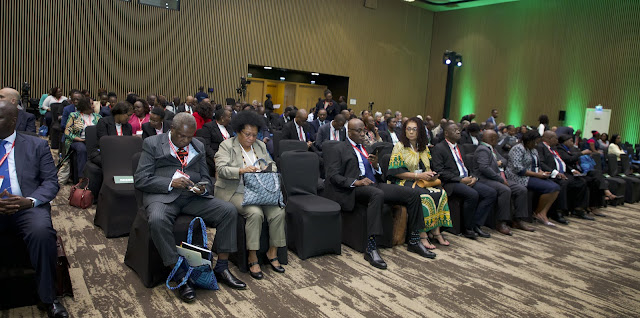- Discourages mechanical application of laws in imposing sentences
By FAUSTINE KAPAMA-Judiciary of Tanzania in Kigali
Judge in Charge of the High Court of Tanzania, Arusha Sub-Registry, Hon. Ilvin Mugeta, has advised Judges and Magistrates from Commonwealth countries to desist from applying laws mechanically when imposing sentences to persons convicted of different crimes, notably the wildlife offences.
Hon. Mugeta gave such polite advice when presenting a topic on “sentencing in wildlife smuggling cases” at the ongoing Commonwealth Magistrates’ and Judges’ Annual Conference being held at Kigali Convention Conference here in Rwanda.
“Conservation is not about protection by arresting, prosecuting and punishing offenders. Even where organized international chain of criminal is involved, those who hunt down the trophy are common men from the surrounding areas. They do so not necessarily to enrich themselves but there are cases where it is about survival…
“…applying the law in sentencing mechanically should be kept for the era to come when trials shall be carried out by computers powered by Artificial Intelligence,” he told the well-attended conference.
In his views, the best deterrence is to remove the benefit of poaching going to the kingpins who are hard to trace. He counseled the investigators to offer the small-time offenders who are used to poach amnesty in exchange for their disclosing those sponsoring them.
The Judge in Charge further advised that judicial officers must be trained in conservation, the international and local legal frameworks from management, arrests, prosecution and sentencing of criminals.
“Sentencing manuals ought to be made available to judges and magistrates. Furthers, laws on wildlife should be as clear as possible incapable of different interpretation to bring certainty and uniformity in application,” he said.
Hon. Mugeta pointed out that sentencing is a complex process that should always be carried out with a human face and should not be undertaken like a computer default mode.
According to him, while deterrent sentence in wildlife crimes is necessary, it is always desirable to retain discretionary powers of the courts to assess the fit sentence per the circumstances of each case.
“Ethical and properly trained magistrates and judges assisted by sentencing manual or guidelines should be trusted as able to impose fitting sentences in the circumstances of each case,” he said.
The Judge in Charge took a little bit longer time to explain in detail the matter, saying that sentencing involves the imposition of punishment by a court upon an accused person who has been found guilty of an offence, a task which has never been easy.
He referred to some cases from Tanzania jurisprudence, notably the case of Peter Mitengo v. Republic [1994] T.L.R 112, in which the Court of Appeal of the United Republic of Tanzania had this to say:
“The process of sentencing is not a mechanical function but that calling for the utmost mental efforts to ensure that the sentence imposed not only fits the offence but also the offender; in this case it was in the interest of justice to impose a shorter term of imprisonment to the first appellant than that meted to his younger colleagues”.
In another case of Kitinda Simbila v R, the same Court of Appeal held, “Admittedly, the sentencing process is one of the most intractable and delicate tasks in the administration of justice, especially where the law has not fixed a minimum sentence. This is where ingenuity and wisdom work together in order to lead us to substantive identical in all circumstances.”
According to him, the decisions in the two cited cases demonstrate that even where ingenuity and wisdom work together, achieving identical in all circumstances of similar offences may be impossible.
Hon. Mugeta explained that sentencing is one of the most sensitive and complicated tasks in the administration of justice and involves balancing the conflicting interests of the convict, the society and the victim in the circumstances of each case.
“Sentencing is more complicated in wildlife crime cases where the offender possessed the trophy for subsistence not business and the law demands for imposition of long imprisonment term,” he said.
It is fact that sentences usually take a form of fines, imprisonment, corporal punishment, death, community service, forfeiture and confiscation, compensation, probation, absolute or conditional discharge and payment of costs.
A sentence can be mandatory or discretionary provided it is within the range permissible under the law. Where the offence is punishable with fine or imprisonment, the choice of punishment becomes a matter of discretion.
However, fine would be more preferable for first offenders save where the offence is grave or widespread in the area. Where there is no statutory punishment for the offence any form of punishment can be imposed at the discretion of the court.
In case of imposing a fine, the financial resources at the disposal of the offender is not a factor for consideration. But the sentence ought to be the one the offender is expected to meet.






Hakuna maoni:
Chapisha Maoni